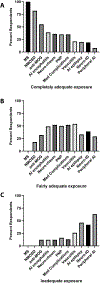Outcomes and future directions for neuroimmunology/multiple sclerosis fellowship training: Survey of recent trainees
- PMID: 32585616
- PMCID: PMC8023409
- DOI: 10.1016/j.msard.2020.102296
Outcomes and future directions for neuroimmunology/multiple sclerosis fellowship training: Survey of recent trainees
Abstract
Background: Neuroimmunology/multiple sclerosis is a rapidly evolving, but still poorly defined subspecialty. Fellowship training is not standardized, and there is substantial variability across sites. Outcomes of fellowship training have not yet been studied. We therefore examined early career choices of neuroimmunology/MS fellowship program graduates and solicited the perspective of current and recent trainees on their fellowship experience as well as opportunities to improve neuroimmunology education.
Methods: We developed a questionnaire to collect information about fellowship training experiences and current medical practice. We identified recent graduates based on records from US training programs and the National MS Society and electronically sent the survey to current trainees and recent graduates (within the last 5 years).
Results: We identified 179 current/recent trainees and successfully reached 157 with survey distributions. Ninety-five individuals (60.5%) returned surveys. Most graduates assumed an academic practice (68%) focused mostly or exclusively on MS and other CNS neuroimmune diseases (55%), and practiced in regions where there were ≥5 other neuroimmunology specialists (51%). Graduates felt well-prepared to manage diagnoses of MS and neuromyelitis optica spectrum disorders but their comfort with rarer CNS neuroimmune diseases varied substantially. Basic immunology, neuro-rheumatology, grant writing and neuro-rehabilitation were identified as high impact areas for cross-disciplinary didactic training. The majority of recent trainees (57%) favored standardizing a core neuroimmunology curriculum, and 48% favored developing a subspecialty certification.
Conclusions: This is the first study to examine practice outcomes and trainee experiences for neuroimmunology training programs. We anticipate that these data will help educators define a core curriculum for the subspecialty and identify complementary skill sets that enhance the traditional clinic-based model of teaching.
Keywords: Graduate medical education; Multiple sclerosis; Neuroimmunology.
Copyright © 2020 Elsevier B.V. All rights reserved.
Figures


Similar articles
-
Education Research: Multiple sclerosis and neuroimmunology fellowship training status in the United States.Neurology. 2020 Mar 17;94(11):495-500. doi: 10.1212/WNL.0000000000009096. Epub 2020 Feb 27. Neurology. 2020. PMID: 32107321 Free PMC article.
-
Acute care surgery fellowship graduates' practice patterns: The additional training is an asset.J Trauma Acute Care Surg. 2017 Jan;82(1):208-210. doi: 10.1097/TA.0000000000001309. J Trauma Acute Care Surg. 2017. PMID: 27779596
-
Pediatric Pathology Fellowship Recruitment-Report of a Survey Conducted by the Fellowship Committee of the Society for Pediatric Pathology.Pediatr Dev Pathol. 2018 May-Jun;21(3):279-284. doi: 10.1177/1093526617722905. Epub 2017 Aug 25. Pediatr Dev Pathol. 2018. PMID: 28840791
-
ACGME Accreditation of Orthopaedic Surgery Subspecialty Fellowship Training Programs.J Bone Joint Surg Am. 2014 Jun 4;96(11):e94. doi: 10.2106/JBJS.M.01340. Epub 2014 Jun 4. J Bone Joint Surg Am. 2014. PMID: 24897751 Review.
-
Subspecialty Training and Certification in Geriatric Psychiatry: A 25-Year Overview.Am J Geriatr Psychiatry. 2017 May;25(5):445-453. doi: 10.1016/j.jagp.2016.12.018. Epub 2017 Jan 9. Am J Geriatr Psychiatry. 2017. PMID: 28214074 Review.
Cited by
-
Consensus Curriculum for Fellowship Training in Multiple Sclerosis and Neuroimmunology.Neurol Clin Pract. 2021 Aug;11(4):352-357. doi: 10.1212/CPJ.0000000000001040. Neurol Clin Pract. 2021. PMID: 34484933 Free PMC article.
-
Curriculum Innovations: Virtual Didactics as a Tool for Harmonizing Education About Rare Topics in Neuroimmunology.Neurol Educ. 2022 Sep;1(1):e200008. doi: 10.1212/ne9.0000000000200008. Neurol Educ. 2022. PMID: 38725979 Free PMC article.
References
-
- Comi G, Radaelli M, Soelberg Sorensen P, 2017. Evolving concepts in the treatment of relapsing multiple sclerosis. Lancet 389, 1347–1356. - PubMed
-
- Cree BAC, Bennett JL, Kim HJ, et al., 2019. Inebilizumab for the treatment of neuromyelitis optica spectrum disorder (N-MOmentum): a double-blind, randomised placebo-controlled phase 2/3 trial. Lancet 394, 1352–1363. - PubMed
-
- Gallien P, Gich J, Sanchez-Dalmau BF, Feneberg W, 2014. Multidisciplinary management of multiple sclerosis symptoms. Eur. Neurol 72 (Suppl 1), 20–25. - PubMed
-
- Linnoila J, Pittock SJ, 2016. Autoantibody-associated central nervous system neurologic disorders. Semin. Neurol 36, 382–396. - PubMed
-
- Lopez-Chiriboga AS, Clardy SL, 2017. Emerging subspecialties in neurology: autoimmune neurology. Neurology 89, e129–e133. - PubMed
MeSH terms
Grants and funding
LinkOut - more resources
Full Text Sources
Medical

